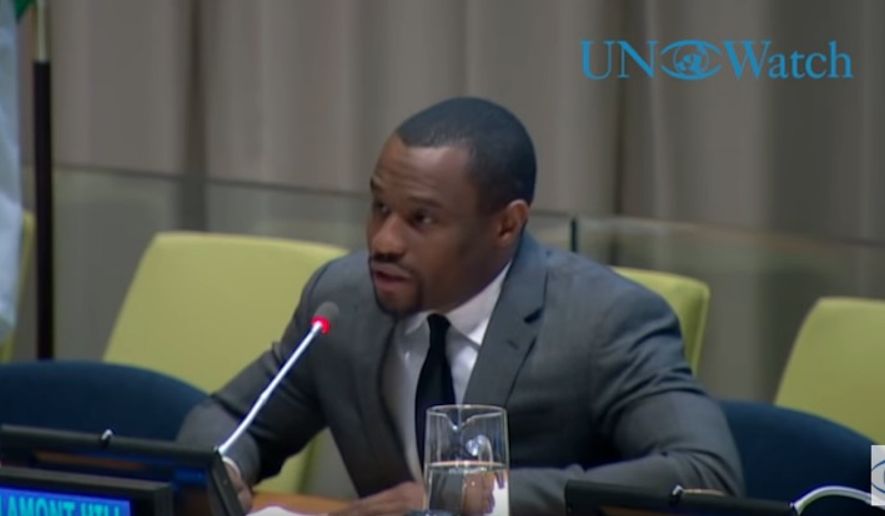Embattled Temple University professor Marc Lamont Hill was condemned Tuesday by the school’s board of trustees for an anti-Israel speech last month that got him fired from CNN, and more action may be coming.
The board approved unanimously a resolution that stated its “displeasure, disappointment and disagreement with Professor Hill’s comments,” emphasizing that Mr. Hill did not speak for the university and that his speech as a private citizen was constitutionally protected.
While Mr. Hill was not punished, board president Patrick O’Connor told the Temple News, the student newspaper, that the trustees are “evaluating” other remedies, although he declined to elaborate.
“I think the board did not go far enough in their condemnation of professor Lamont Hill,” trustee Marina Kats told the News. “I think we should explore all the options. … He does have freedom to speak as he wishes … however, when it is inciteful speech, he no longer has the protection of the First Amendment.”
At its Tuesday meeting, the @TempleUniv Board of Trustees unanimously condemned @marclamonthill’s controversial UN speech, which has sparked national outrage. https://t.co/ocwJpWWbu0
— The Temple News (@TheTempleNews) December 11, 2018
In his Nov. 28 speech, Mr. Hill condoned the use of force by “an occupied people” and ended with the phrase, “a free Palestine from the river to the sea,” a slogan used by the U.S.-designated terrorist group Hamas to call for the abolition of Israel.
“I’m not Jewish, but if I had a Jewish child, I’m not so sure I want him in that guy’s class,” trustee Tony McIntyre said.
The resolution came amid a debate over academic freedom that has roiled the Philadelphia campus amid calls for Mr. Hill to be fired or reprimanded.
Two weeks ago, Mr. O’Connor described Mr. Hill’s comments as “hate speech” and said the board was considering its options.
“I’m not happy. The board’s not happy. The administration’s not happy,” Mr. O’Connor told the Philadelphia Inquirer. “People wanted to fire him right away. We’re going to look at what remedies we have.”
CNN dropped Mr. Hill as a political commentator shortly after he was accused of condoning violence against Israel and anti-Semitism during his speech, which he has denied.
The Temple administration has remained tight-lipped on whether the university is considering censuring Mr. Hill while defending his free-speech rights.
“We recognize that Professor Hill’s comments are his own, that his speech as a private individual is entitled to the same Constitutional protection of any other citizen, and that he has through subsequent statements expressly rejected anti-Semitism and anti-Semitic violence,” said the university in a Tuesday statement.
Mr. Hill, a longtime critic of Israel, has issued statements denouncing anti-Semitism and insisted that his use of the phrase was “not a call to destroy anything or anyone” and that he wanted “peace, freedom, and security for everyone.”
His critics have since posted a video from a Sept. 28 conference of the U.S. Campaign for Palestinian Rights, in which Mr. Hill accused Israel of “poisoning your water,” which the Jewish Journal described as an “anti-Semitic blood libel.”
During his U.N. speech timed to the International Day of Solidarity with the Palestinian People, Mr. Hill said he was “boycotting Israeli water.”
Mr. Hill joined the faculty last year as the first professor to assume the Steve Charles Chair in Media, Cities and Solutions, a post endowed with a $2 million gift from Mr. Charles, a trustee.
More than 30 members of the Temple faculty signed a letter last week expressing “no confidence” in Mr. O’Connor and defending Mr. Hill’s free-speech rights.
“We thought his arguments were passionate, considered, and thoughtful, and that they respected the humanity of Palestinians and Israelis,” said the letter. “Regardless of whether we agree or disagree with him, we support his freedom to espouse his views.”
• Valerie Richardson can be reached at vrichardson@washingtontimes.com.




Please read our comment policy before commenting.